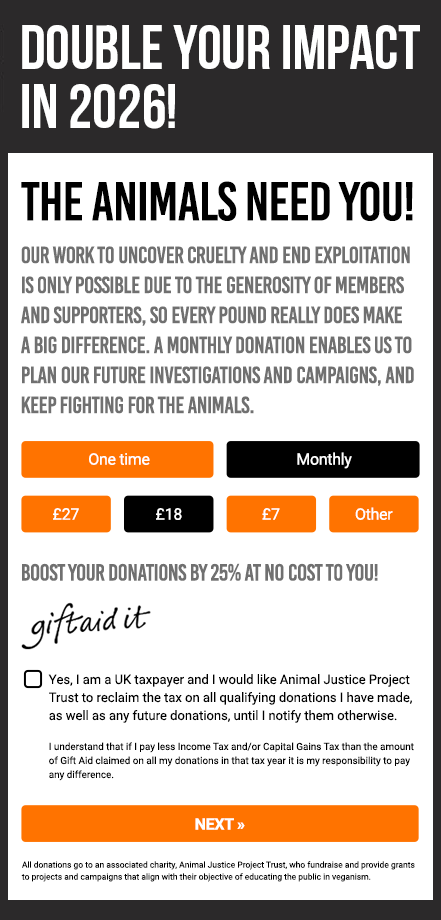
General
Animal Farming Propaganda Exposed

Blog written by Julie Hurst, volunteer blog writer
‘Veganism by stealth’. This is how plant-based diets are being surreptitiously imposed on an unsuspecting meat-eating public according to the Countryside Alliance. In a recent post on their website they state, “we are able to make decisions for ourselves” about what we should or shouldn’t be eating, implying that eating meat is a choice. However, we don’t actually choose to eat meat, it’s simply the default position, and the only ones exercising any form of choice when it comes to food are those who choose not to.
But preserving the illusion of choice is essential to maintaining the status quo, and unbeknown to the majority the animal agriculture industry employs a vast array of tactics to ensure our eating habits continue to align with its own self interests. It uses its considerable power to influence government policy in its favour, both nationally and globally, and with help from vested interests ensures we remain uninformed at best and misinformed at worst about the realities of livestock farming and its impacts; on the environment, on animals, with regard to food security and on our health.
'AGRICULTURE IS A SOLUTION TO CLIMATE CHANGE'
Despite widespread recognition among the scientific community and beyond that livestock production contributes significantly to greenhouse gas emissions, the animal agriculture industry is engaged in a multi-million dollar effort to slow down a move towards plant-based diets. In a recent report the Freedom Food Alliance sets out how the sector employs methods, commonly associated with the likes of the tobacco and fossil fuel industries, to undermine increasing calls for the need to move away from meat and dairy production for the sake of the planet.
According to the report, animal agriculture companies have been actively working behind the scenes for decades to prevent discussions about reducing meat consumption from being included in climate policy talks. For example, it states that back in 2021, the initial version of the mitigation report by the Intergovernmental Panel on Climate Change (IPCC) referenced transitioning to plant-based diets, but that this suggestion was removed following pressure from lobbyists. And although at last year’s annual ‘COP’ climate summit it seemed that further industry pressure had been resisted – it was dubbed the food COP and two-thirds of the food being served was either vegetarian or vegan in a nod to the climate footprint of the livestock industry – this year’s gathering was starkly different. Attended by triple the number of lobbyists from the meat and dairy industry, it was hailed a success by the sector for its ‘positive outcomes’, which it claimed included widespread recognition that agriculture was a “solution” to climate change.
The ability to exert such pressure illustrates the huge amount of political sway held by the animal agriculture industry. The Freedom Food Alliance report notes how markets today are now increasingly driven by lobbing rather than genuine demand. And it’s not only lobbying that favours livestock farming when it comes to matters of climate change, the media is implicated in the report too. It highlights the results of a recent study which showed that 93% of climate news never mentions meat, and this helps to explain why the role of industrial meat production in the environmental crisis is generally underestimated by the public, despite it being one of the major contributors.

'UK FARMERS HAVE SOME OF THE HIGHEST ANIMAL WELFARE STANDARDS IN THE WORLD’
While the industry claims that the treatment of farmed animals in the UK and the conditions in which they are kept are beyond reproach, Animal Justice Project undercover investigations repeatedly expose widespread suffering, neglect and cruelty. The establishments under scrutiny rarely, if ever, acknowledge culpability, which is relatively easy for them to do given that farming operations are well hidden from the public. Instead, those accused often directly challenge the validity or credibility of the claims, attempt to shift the blame, or even portray themselves as victims in an effort to shield themselves from criticism.
Last year for example, Lidl was the focus of store spot checks by campaign group Open Cages which was investigating the incidence of hock burn in supermarket chickens. The group found that 74% of the chickens they checked had the condition, which is caused by birds having to lie in their own waste. Not only did Lidl try to undermine the credibility of the data, claiming that it represented only a tiny percentage of the fresh chicken it sold in the same period, but a spokesperson stated that the figures provided “strongly conflict with our own data”; data which the company declined to share.
Free-range egg producer Glenrath Farms, exposed in one of our own investigations, was quick to try and shift the blame when contacted by the Independent about the appalling conditions at its premises. Rather than address the issue, a spokesperson said, “We’re disappointed animal activists chose to break into our farm, causing a significant biosecurity and disease risk,” adding, “It looks as though the activists were in the shed whilst the birds were resting, which would cause them to become upset and distressed”. Claims that were simply not true.
Such evasive responses are designed to create a sympathetic image that will elicit understanding from the public, who it is hoped will continue to consume the industry’s products without question. They completely sidestep the issue of animal welfare which, regardless of how the industry and others try to frame it, is merely used as a sales tool and potential means for increasing profit. When asked what the advantages of "outdoor bred pork" were for example, the former CEO of Red Tractor, David Clarke, said, “The advantages are some people are prepared to pay more money for it because they think it’s better welfare”.

‘LARGE-SCALE FARMING IS NEEDED TO MEET THE UK’S DEMAND FOR FOOD’
“Food security is national security,” stated Tom Bradshaw, president of the National Farmers Union (NFU), at the UK government’s recent Farm to Fork Summit, and industry claims of the critical role animal agriculture plays in this area are constant. For example, in the face of growing calls to halt the spread of so-called mega farms across the country, chief executive of the British Poultry Council, Richard Griffiths, said “To unfairly label it (large-scale farming) as a bad thing overlooks the essential role it plays in our food security and economic stability”. And in response to fierce opposition to plans by Cranswick to construct what would be one of the UK largest industrial farms, managing director Barry Lock was quick to defend the project as it would, “ensure we still have UK food on UK shelves”.
The obvious fear mongering is clear, but despite the claims made, animal agriculture is actually one of the major contributors to global food insecurity, given the inherent waste associated with routing crops through animals – the National Food Strategy shows that 85% of agricultural land in the UK is used to grow crops to feed animals who are farmed, not humans.
This glaring inefficiency is not only glossed over by governments, but they continue to fund the industry with a disproportionate amount of more than $200 billion of taxpayers' money, our money, being given to farmers worldwide every year for raising animals or growing crops to feed them. In comparison, just 0.1% of the subsidies awarded to animal agriculture are awarded to supporting plant-based alternatives. And this disparity in funding is echoed in investment levels. Between 2015 and 2020 financial institutions gave over $478 billion to meat and dairy corporations globally, compared to just $5.9billion that was given to plant-based food companies.
Unsurprisingly, this huge financial imbalance has a profound effect on market prices, artificially lowering the price of meat at the expense of alternatives. This in turn has a significant influence on our behaviour as consumers, and on what ends up in our baskets at the supermarket.

'LIVESTOCK FARMING IS NECESSARY FOR NUTRITION’
Meat may be a source of nutrition, but so is a well-planned plant-based diet. Nevertheless, the animal agriculture industry and its allies continue to inflate the perception of the health benefits of certain animal products while denigrating those of the plant-based products which compete with them.
With the launch of its recent ‘Let's Eat Balanced’ initiative, the farmer-funded Agriculture and Horticulture Development Board (AHDB) not only aims to “protect long-term consumer attitudes towards naturally produced British red meat and dairy” but to “reinforce how they help form part of a healthy and sustainable diet”, claims which have been labelled misleading by doctors who have called for the campaign to be withdrawn. They state that the messaging is “at odds with established scientific evidence” on healthy diets, such as the links between red meat and cancer and type 2 diabetes and the increased risk of heart disease and high blood pressure from meat consumption. They also point out that “Replacing animal protein with plant sources of protein is associated with significant improvements in health outcomes”, something that the campaign unsurprisingly fails to mention.
The particular language chosen by AHDB is also telling, especially the phrase ‘naturally produced’ when referring to meat and dairy. When discussing plant-based diets, the industry rarely acknowledges the abundance of readily available, wholly natural foods, and instead persists in focusing on manufactured products and using terms such as 'fake meat' and ‘processed goop’.

‘THE SHORT-LIVED BOOM IN VEGANISM HAS FADED’
Although the number of vegans in the UK is growing, the animal agriculture industry continues to paint veganism in a poor light. From a passing fad, to a propaganda pushing stealth campaign, veganism is framed as being abnormal, unnatural and unnecessary. Similarly, vegans are often portrayed as overly emotional and irrational, and any notion of being compassionate, critical thinkers is lost among a sea of negative stereotypes.
This media manipulation can not only cause meat-eaters to feel defensive, but it also helps to ensure they resist the very information that could empower them to proactively consider their food choices, and in doing so preserves the status quo.
Unless and until we acknowledge that the prime concern of the animal agriculture industry is to protect and further its own interests, consumers will, by default, continue to support its practices. In doing so, we will not only pay the price financially, but morally, in terms of our health and future security, and at the expense of the planet. And of course, the animals who are farmed will always pay the ultimate price.

As always,
For the animals.

.png)


.png)













.png)